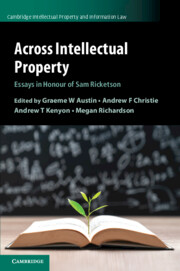Book contents
- Across Intellectual Property
- Cambridge Intellectual Property and Information Law
- Frontispiece
- Across Intellectual Property
- Copyright page
- Contents
- Notes on Contributors
- Introduction
- Part I Across Regimes
- Part II Across Jurisdictions
- Part III Across Disciplines
- 13 The Challenges of Intellectual Property Legal History Research
- 14 Connecting Intellectual Property and Human Rights in the Law School Syllabus
- 15 Copyright and Privacy
- 16 Resisting Labels
- 17 Trade Marks and Cultural Identity
- 18 Intellectual Property Law and Empirical Research
- Part IV Across Professions
- Laudatio
- Cambridge Intellectual Property and Information Law
18 - Intellectual Property Law and Empirical Research
from Part III - Across Disciplines
Published online by Cambridge University Press: 27 March 2020
- Across Intellectual Property
- Cambridge Intellectual Property and Information Law
- Frontispiece
- Across Intellectual Property
- Copyright page
- Contents
- Notes on Contributors
- Introduction
- Part I Across Regimes
- Part II Across Jurisdictions
- Part III Across Disciplines
- 13 The Challenges of Intellectual Property Legal History Research
- 14 Connecting Intellectual Property and Human Rights in the Law School Syllabus
- 15 Copyright and Privacy
- 16 Resisting Labels
- 17 Trade Marks and Cultural Identity
- 18 Intellectual Property Law and Empirical Research
- Part IV Across Professions
- Laudatio
- Cambridge Intellectual Property and Information Law
Summary
In recent decades, empirical research has developed across many areas of intellectual property law. This chapter examines challenges that can arise in conducting, or drawing upon, empirical research in IP law. These include assessing a study’s value in terms of methodology, sample choice and size, execution and reporting, as well as the conclusions that might reasonably be drawn from the research. As IP scholars generate more empirically informed research, there can be value in asking whether the studies are robust and well executed, whether they reveal information or viewpoints previously not recognised, and whether they produce work from which legal or scholarly lessons can be drawn. Robust, well-conducted and analysed empirical studies may provide insights that develop IP scholarship in new ways and potentially improve policy and decision making. This underlines the importance of not being complacent about empirical analysis but being open to rigorous questioning, both individually and collectively, about our practices.
Keywords
- Type
- Chapter
- Information
- Across Intellectual PropertyEssays in Honour of Sam Ricketson, pp. 240 - 252Publisher: Cambridge University PressPrint publication year: 2020

